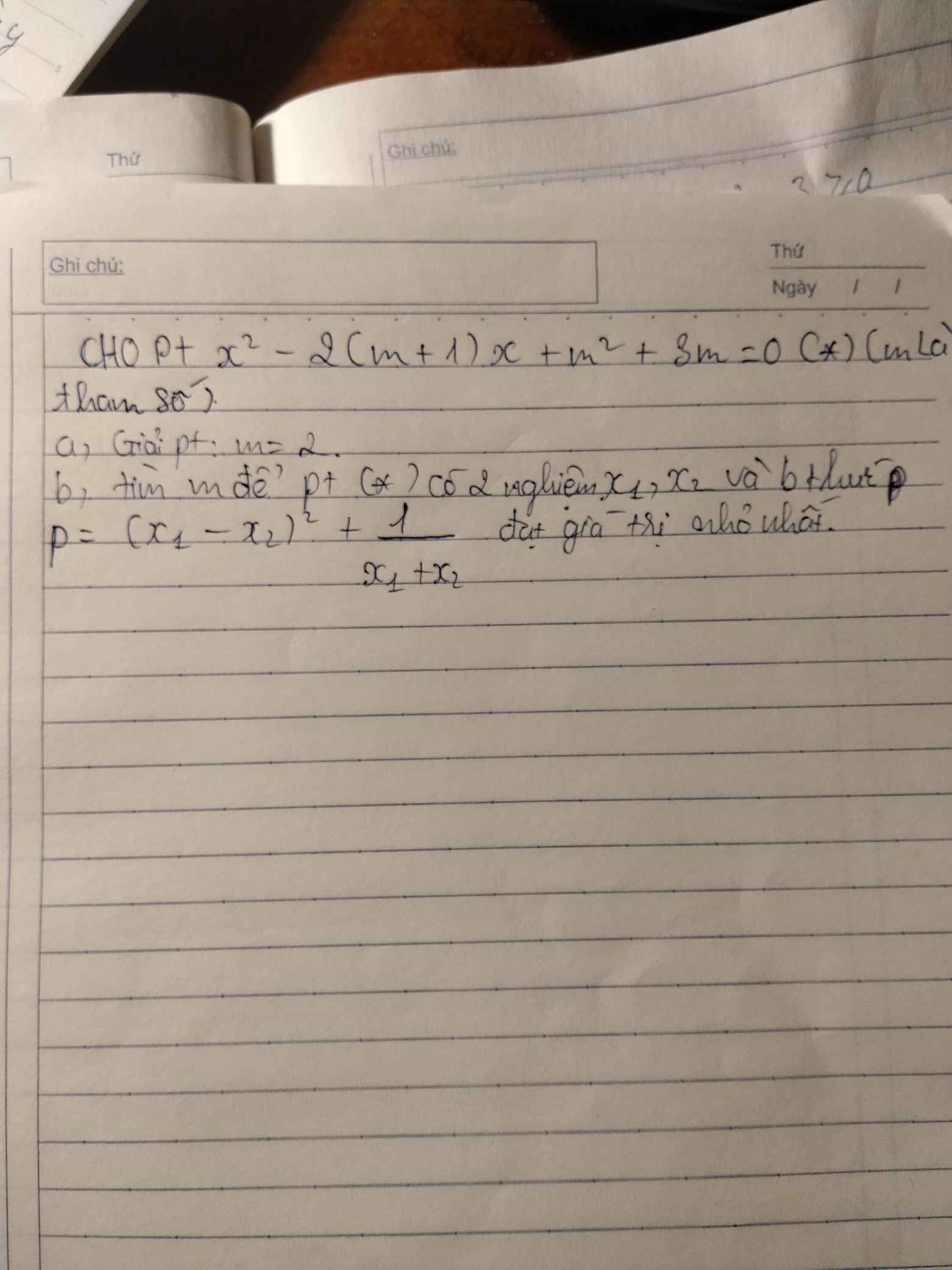Cho pt x2 -2(m-1)x+m2 -3m=0 (1) , m là tham số, tìm m để :
a. Pt (1) có thí nghiệm
Cho pt : x2 - 2(m-3) x + m2 - 1 = 0 ( m là tham số ). Tìm m để pt : a) vô nghiêm b) có nghiệm c) có nghiệm kép. Tìm nghiệm kép d) có 2 nghiệm phân biệt
Ta có: \(\Delta=4\left(m-3\right)^2-4.\left(m^2-1\right)\)
a. Để phương trình vô nghiệm thì \(\Delta< 0\Leftrightarrow\left(m-3\right)^2< m^2-1\Leftrightarrow m^2-6m+9< m^2-1\Leftrightarrow6m>10\Leftrightarrow m>\dfrac{10}{6}=\dfrac{5}{3}\)
b. Để phương trình có nghiệm thì:
\(\Delta\ge0\Leftrightarrow\left(m-3\right)^2\ge m^2-1\Leftrightarrow m^2-6m+9\ge m^2-1\Leftrightarrow6m\le10\Leftrightarrow m\le\dfrac{10}{6}=\dfrac{5}{3}\)
c. Để phương trình có nghiệm kép thì:
\(\Delta=0\Leftrightarrow\left(m-3\right)^2=m^2-1\Leftrightarrow m^2-6m+9=m^2-1\Leftrightarrow6m=10\Leftrightarrow m=\dfrac{10}{6}=\dfrac{5}{3}\)
Nghiệm kép của phương trình là: \(\dfrac{-b}{2a}=\dfrac{2\left(m-3\right)}{2.1}=\dfrac{2\left(\dfrac{5}{3}-3\right)}{2}=-\dfrac{4}{3}\)
d. Để phương trình có nghiệm phân biệt thì:
\(\Delta>0\Leftrightarrow\left(m-3\right)^2>m^2-1\Leftrightarrow m^2-6m+9>m^2-1\Leftrightarrow6m< 10\Leftrightarrow m< \dfrac{10}{6}=\dfrac{5}{3}\)
a, Để pt vô nghiệm
\(\Delta'=\left(m-3\right)^2-\left(m^2-1\right)=-6m+9+1=-6m+10< 0\Leftrightarrow m>\dfrac{5}{3}\)
b, Để pt có nghiệm
\(\Delta'=-6m+10\ge0\Leftrightarrow m\le\dfrac{5}{3}\)
c, Để pt có nghiệm kép
\(\Delta'=-6m+10=0\Leftrightarrow m=\dfrac{5}{3}\)
\(x_1=x_2=\dfrac{2\left(m-3\right)}{2}=m-3\)
d, Để pt có 2 nghiệm pb
\(\Delta=-6m+10>0\Leftrightarrow m< \dfrac{5}{3}\)
cho pt bậc hai x2 + (2m+1)x + m2 = 0 (m là tham số )
a) giải pt khi m=1
b) tìm để pt có nghiệm kép. Tìm nghiệm kép đó
a: khi m=1 thì pt sẽ là:
x^2+3x+1=0
=>\(x=\dfrac{-3\pm\sqrt{5}}{2}\)
b: Δ=(2m+1)^2-4m^2
=4m+1
Để phương trình có nghiệm kép thì 4m+1=0
=>m=-1/4
Khi m=-1/4 thì pt sẽ là:
x^2+x*(-1/4*2+1)+(-1/4)^2=0
=>x^2+1/2x+1/16=0
=>(x+1/4)^2=0
=>x+1/4=0
=>x=-1/4
cho pt x2-2(m-1)x+m2-3m=0(*)
a) tìm m để 2 nghiệm trái dấu
b) tìm m để pt có đùng 1 nghiệm âm
c)tìm m để pt có 1 nghiệm =0 tìm nghiệm còn lại
d) tìm ht liên hệ giữa 2 nghiệm k phụ thuộc vào m
e) tìm m để pt có 2 nghiệm tm c12+x22=8
Bài 1: Cho pt ẩn x:
x2 - 2(m + 1)x + m2 + 7 = 0 (1)
a) Giải pt (1) khi m = -1; m = 3.
b) Tìm m để pt (1) có nghiệm là 4. Tìm nghiệm còn lại.
c) Tìm m để pt (1) có 2 nghiệm x1, x2 thỏa:
* x12 + x22 = 0
* x1 - x2 = 0
Bài 2: Cho pt ẩn x:
x2 - 2x - m2 - 4 = 0 (1)
a) Giải pt (1) khi m = -2.
b) Tìm m để pt (1) có 2 nghiệm x1, x2 thỏa mãn:
* x12 + x22 = 20
* x13 + x23 = 56
* x1 - x2 = 10
Bài 1:
a, Thay m=-1 vào (1) ta có:
\(x^2-2\left(-1+1\right)x+\left(-1\right)^2+7=0\\
\Leftrightarrow x^2+1+7=0\\
\Leftrightarrow x^2+8=0\left(vô.lí\right)\)
Thay m=3 vào (1) ta có:
\(x^2-2\left(3+1\right)x+3^2+7=0\\ \Leftrightarrow x^2-2.4x+9+7=0\\ \Leftrightarrow x^2-8x+16=0\\ \Leftrightarrow\left(x-4\right)^2=0\\ \Leftrightarrow x-4=0\\ \Leftrightarrow x=4\)
b, Thay x=4 vào (1) ta có:
\(4^2-2\left(m+1\right).4+m^2+7=0\\ \Leftrightarrow16-8\left(m+1\right)+m^2+7=0\\ \Leftrightarrow m^2+23-8m-8=0\\ \Leftrightarrow m^2-8m+15=0\\ \Leftrightarrow\left(m^2-3m\right)-\left(5m-15\right)=0\\ \Leftrightarrow m\left(m-3\right)-5\left(m-3\right)=0\\ \Leftrightarrow\left(m-3\right)\left(m-5\right)=0\\ \Leftrightarrow\left[{}\begin{matrix}m=3\\m=5\end{matrix}\right.\)
c, \(\Delta'=\left[-\left(m+1\right)\right]^2-\left(m^2+7\right)=m^2+2m+1-m^2-7=2m-6\)
Để pt có 2 nghiệm thì \(\Delta'\ge0\Leftrightarrow2m-6\ge0\Leftrightarrow m\ge3\)
Theo Vi-ét:\(\left\{{}\begin{matrix}x_1+x_2=2m+2\\x_1x_2=m^2+7\end{matrix}\right.\)
\(x_1^2+x_2^2=0\\ \Leftrightarrow\left(x_1+x_2\right)^2-2x_1x_2=0\\ \Leftrightarrow\left(2m+2\right)^2-2\left(m^2+7\right)=0\\ \Leftrightarrow4m^2+8m+4-2m^2-14=0\\ \Leftrightarrow2m^2+8m-10=0\\ \Leftrightarrow\left[{}\begin{matrix}m=1\left(ktm\right)\\m=-5\left(ktm\right)\end{matrix}\right.\)
\(x_1-x_2=0\\ \Leftrightarrow\left(x_1-x_2\right)^2=0\\ \Leftrightarrow\left(x_1+x_2\right)^2-4x_1x_2=0\\ \Leftrightarrow\left(2m+2\right)^2-4\left(m^2+7\right)=0\\ \Leftrightarrow4m^2+8m+4-4m^2-28=0\\ \Leftrightarrow8m=28=0\\ \Leftrightarrow m=\dfrac{7}{2}\left(tm\right)\)
Bài 2:
a,Thay m=-2 vào (1) ta có:
\(x^2-2x-\left(-2\right)^2-4=0\\ \Leftrightarrow x^2-2x-4-4=0\\ \Leftrightarrow x^2-2x-8=0\\ \Leftrightarrow\left[{}\begin{matrix}x=4\\x=-2\end{matrix}\right.\)
b, \(\Delta'=\left(-m\right)^2-\left(-m^2-4\right)\ge0=m^2+m^2+4=2m^2+4>0\)
Suy ra pt luôn có 2 nghiệm phân biệt
Theo Vi-ét:\(\left\{{}\begin{matrix}x_1+x_2=2\\x_1x_2=-m^2-4\end{matrix}\right.\)
\(x_1^2+x_2^2=20\\ \Leftrightarrow\left(x_1+x_2\right)^2-2x_1x_2=20\\ \Leftrightarrow2^2-2\left(-m^2-4\right)=20\\ \Leftrightarrow4+2m^2+8-20=0\\ \Leftrightarrow2m^2-8=0\\ \Leftrightarrow m=\pm2\)
\(x_1^3+x_2^3=56\\ \Leftrightarrow\left(x_1+x_2\right)^3-3x_1x_2\left(x_1+x_2\right)=56\\ \Leftrightarrow2^3-3\left(-m^2-4\right).2=56\\ \Leftrightarrow8-6\left(-m^2-4\right)-56\\ =0\\ \Leftrightarrow8+6m^2+24-56=0\\ \Leftrightarrow6m^2-24=0\\ \Leftrightarrow m=\pm2\)
\(x_1-x_2=10\\ \Leftrightarrow\left(x_1-x_2\right)^2=100\\ \Leftrightarrow\left(x_1+x_2\right)^2-4x_1x_2-100=0\\ \Leftrightarrow2^2-4\left(-m^2-4\right)-100=0\\ \Leftrightarrow4+4m^2+16-100=0\\ \Leftrightarrow4m^2-80=0\\ \Leftrightarrow m=\pm2\sqrt{5}\)
Cho pt x²-2(m+1)x+m²+3m=0(*) (m là tham số) tìm m để pt (*) có 2 nghiệm 
Để pt có nghiệm thì \(\Delta'=\left(m+1\right)^2-\left(m^2+3m\right)\ge0\Leftrightarrow1-m\ge0\Leftrightarrow m\le1\)
a)Tự làm
b)Để pt có hai nghiệm <=>\(\Delta=4\left(m+1\right)^2-4\left(m^2+3m\right)=-4m+4\ge0\)
<=>\(m\le1\)
Theo viet: \(\left\{{}\begin{matrix}x_1+x_2=2\left(m+1\right)\\x_1x_2=m^2+3m\end{matrix}\right.\)
Có \(P=\left(x_1-x_2\right)^2+\dfrac{1}{x_1+x_2}\)(đk: \(x_1+x_2\ne0\Rightarrow m\ne-1\))
\(=\left(x_1+x_2\right)^2-4x_1x_2+\dfrac{1}{x_1+x_2}\)
\(=4\left(m+1\right)^2-4\left(m^2+3m\right)+\dfrac{1}{2\left(m+1\right)}\)
\(=-4m+4+\dfrac{1}{2m+2}\)\(=\dfrac{-8m^2+9}{2m+2}\)
\(\Rightarrow P\left(2m+2\right)=-8m^2+9\)
\(\Leftrightarrow-8m^2-2mP+9-2P=0\) (1)
Coi (1) là pt bậc hai ẩn m và \(m\le1\), \(m\ne-1\)
Pt (1) có nghiệm\(\Leftrightarrow\left\{{}\begin{matrix}\Delta=4P^2-64P+288\ge0\left(lđ\right)\\m_1+m_2\le2\\\left(m_1-1\right)\left(m_2-1\right)\le0\end{matrix}\right.\)
\(\Rightarrow\left\{{}\begin{matrix}-\dfrac{1}{P}\le2\\m_1.m_2-\left(m_1+m_2\right)+1\le0\end{matrix}\right.\)
\(\Leftrightarrow\left\{{}\begin{matrix}P\ge-2\\\dfrac{9-2P}{-8}+\dfrac{P}{4}+1\le0\end{matrix}\right.\) \(\Leftrightarrow\left\{{}\begin{matrix}P\ge-16\\P\ge\dfrac{1}{4}\end{matrix}\right.\)
\(\Rightarrow P\ge\dfrac{1}{4}\)
\(\Rightarrow P_{min}=\dfrac{1}{4}\Leftrightarrow m=1\) (thỏa)
Vậy...
Bài 1: Cho pt ẩn x: x2 - 2(m+1) x + m2 - m = 0 (1)
a) Giải pt (1) khi m = -1, m = 0
b) Tìm m để pt (1) có 1 nghiệm là 1. Tìm nghiệm còn lại.
c) Trong trường hợp pt (1) có 2 nghiệm hãy tính: x12 + x22; (x1-x2)2.
Bài 2: Cho pt: x2 - 4x + 3 = 0
Tính giá trị biểu thức:
a) x12 + x22
b) \(\dfrac{1}{x1+2}+\dfrac{1}{x2+2}\)
c) x13 + x23.
d) x1 - x2.
Bài 2:
a: \(x^2-4x+3=0\)
=>x=1 hoặc x=3
\(x_1^2+x_2^2=1^2+3^2=10\)
b: \(\dfrac{1}{x_1+2}+\dfrac{1}{x_2+2}=\dfrac{1}{1}+\dfrac{1}{5}=\dfrac{6}{5}\)
c: \(x_1^3+x_2^3=1^3+3^3=28\)
d: \(x_1-x_2=1-3=-2\)
Cho pt x2 + 2(m+1)x - 2m4 + m2 = 0 (m là tham số)
a) Giải pt khi m = 1
b) Chứng minh rằng pt luôn có 2 nghiệm phân biệt với mọi m
a)
Thế m = 1 vào PT được: \(x^2+2\left(1+1\right)x-2.1^4+1^2=0\)
<=> \(x^2+4x-1=0\)
\(\Delta=16+4=20\)
\(\left\{{}\begin{matrix}x_1=-2+\sqrt{5}\\x_2=-2-\sqrt{5}\end{matrix}\right.\)
b) đề đúng chưa=)
Cho pt bậc x2 - (3m-1)x + 2m2 + m - 1=0 (m là tham số)
a) Giải pt khi m= -1
b) Giả sử x12 , x22 là hai nghiệm pb của chương trình. Tìm m để B= x12 - x22 - 3x1x2 đạt min
a: Khi m=-1 thì phương trình sẽ là:
x^2-(-3-1)x+2-1-1=0
=>x^2+4x=0
=>x=0 hoặc x=-4
cho PT x2 - 2(m+1)x + m2 +3m + 2 = 0
b) tìm m để PT có 2 nghiệm phân biệt sao cho tổng bình phương 2 nghiệm = 12
b: \(\text{Δ}=\left(2m+2\right)^2-4\left(m^2+3m+2\right)\)
\(=4m^2+8m+4-4m^2-12m-8\)
=-4m-4
Để phương trình có hai nghiệm phân biệt thì -4m-4>0
=>-4m>4
hay m<-1
Theo đề, ta có: \(\left(x_1+x_2\right)^2-2x_1x_2=12\)
\(\Leftrightarrow\left(2m+2\right)^2-2\left(m^2+3m+2\right)-12=0\)
\(\Leftrightarrow4m^2+8m+4-2m^2-6m-4-12=0\)
\(\Leftrightarrow2m^2+2m-12=0\)
\(\Leftrightarrow m^2+m-6=0\)
\(\Leftrightarrow\left(m+3\right)\left(m-2\right)=0\)
=>m=-3(nhận) hoặc m=2(loại)